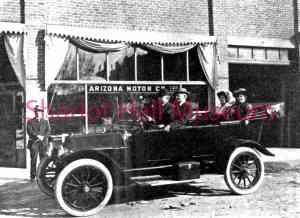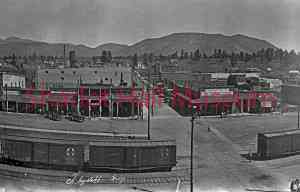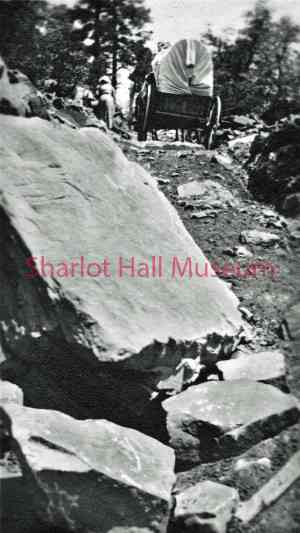By Nancy Burgess
This is Part 2 of a true story about an automobile – a 1913 Studebaker SA25 “machine” and the people who took it on an approximately 1,000-mile tour of Arizona in 1913.
 “An Arizona Auto Adventure: Clarence Boynton’s 1913 Travelogue” is the story of the excitement, sights, experiences, trials and tribulations of a road trip in the early days of automobile travel in a place and time when the “Wild West” of Arizona was still in evidence. The book includes all of Clarence Boynton’s journal of the trip, which he titled “An Account of the Watkins-Boynton 1,000 Mile Tour Through Northern Arizona, August 28 to October 3, 1913.” It is a treasure, and gives today’s traveler an eye-opening glimpse of travel in Arizona just one year after statehood.
“An Arizona Auto Adventure: Clarence Boynton’s 1913 Travelogue” is the story of the excitement, sights, experiences, trials and tribulations of a road trip in the early days of automobile travel in a place and time when the “Wild West” of Arizona was still in evidence. The book includes all of Clarence Boynton’s journal of the trip, which he titled “An Account of the Watkins-Boynton 1,000 Mile Tour Through Northern Arizona, August 28 to October 3, 1913.” It is a treasure, and gives today’s traveler an eye-opening glimpse of travel in Arizona just one year after statehood.
Clarence N. Boynton, his wife Marquita and his friend, physician William Warner Watkins, along with Watkins’s wife Bessie and their nine-month-old daughter Merial, took a driving trip in Dr. Watkins’s 1913 Studebaker in the fall of 1913. It would be a 36-day trip, with several days of delays due to breakdowns, unplanned stops and other misadventures.
 In Part 1, the Boyntons and Watkinses traveled from Phoenix to Ash Fork. Next, it was on to the Grand Canyon, Flagstaff, Strawberry, Pine, Payson, Roosevelt, the Apache Trail, Mesa and back to Phoenix, with numerous exciting, dangerous or dreaded places in between. As Clarence wrote, “[i]t was no country for an auto.”
In Part 1, the Boyntons and Watkinses traveled from Phoenix to Ash Fork. Next, it was on to the Grand Canyon, Flagstaff, Strawberry, Pine, Payson, Roosevelt, the Apache Trail, Mesa and back to Phoenix, with numerous exciting, dangerous or dreaded places in between. As Clarence wrote, “[i]t was no country for an auto.”
Travel in the early days of statehood relied mainly on two or four-legged conveyances – one’s own two feet, as well as burros, horses, mules and oxen. Motor cars were few and far between, especially in rural areas. So were “gas stations.” Frequently, when the “machine” was out of order, the Watkinses and Boyntons took advantage of these non-mechanical conveyances.
This part of the trip took the travelers through the largest ponderosa pine forest in the U.S. The route apparently took them to, or through, the following: from Flagstaff on the east side of Lake Mary, where the mapped road ended, through Clark’s Valley and past Lake Mary; then east of Mormon Lake, through Willow Canyon; through Long Valley, where they stopped at the Ranger Station; Clover Springs, past Pivot Rock Hill and Baker Butte; Strawberry, Strawberry Hill and Strawberry Valley; Pine; a side trip to the Natural Bridge, and on to Payson. On their way from Flagstaff to Payson, they encountered quite a few problems, not to mention Strawberry Hill. One is described by Clarence:
 “Last spring, when we were at Payson, we told the people there that we would be coming in the fall. So, when we got to Flagstaff, we began inquiring the way and the condition of the road. One said that an auto could not get over it; another, that there was one bad hill; while yet another said that, if he really wanted to go that way, he wouldn’t hesitate at all. On all the road so far, we had had the Arizona Road Map to follow but this, being an uncharted road, we resolved to chart it ourselves. So we spent quite a little time on our speedometer which had just frozen on account of its wetting of two weeks previous. We got it running and, when we got out nine miles, we discovered that it was not working and found that the connection on the wheel was lost off. We were delayed two hours here, while we searched the road for the missing part. We knew it was not far to the place where we had lost it. We did not find it!”
“Last spring, when we were at Payson, we told the people there that we would be coming in the fall. So, when we got to Flagstaff, we began inquiring the way and the condition of the road. One said that an auto could not get over it; another, that there was one bad hill; while yet another said that, if he really wanted to go that way, he wouldn’t hesitate at all. On all the road so far, we had had the Arizona Road Map to follow but this, being an uncharted road, we resolved to chart it ourselves. So we spent quite a little time on our speedometer which had just frozen on account of its wetting of two weeks previous. We got it running and, when we got out nine miles, we discovered that it was not working and found that the connection on the wheel was lost off. We were delayed two hours here, while we searched the road for the missing part. We knew it was not far to the place where we had lost it. We did not find it!”
But they did find their way, and returned to St. Luke’s Home in Phoenix, tired and happy to be home. They had a great trip, and, as Clarence wrote, “we didn’t begrudge a bit of it.”
“Days Past” is a collaborative project of the Sharlot Hall Museum and the Prescott Corral of Westerners International (www.prescottcorral.org). This and other Days Past articles are also available at archives.sharlothallmuseum.org/articles/days-past-articles/1 The public is encouraged to submit proposed articles and inquiries to dayspast@sharlothallmuseum.org Please contact SHM Research Center reference desk at 928-277-2003, or via email at archivesrequest@sharlothallmuseum.org for information or assistance with photo requests.


